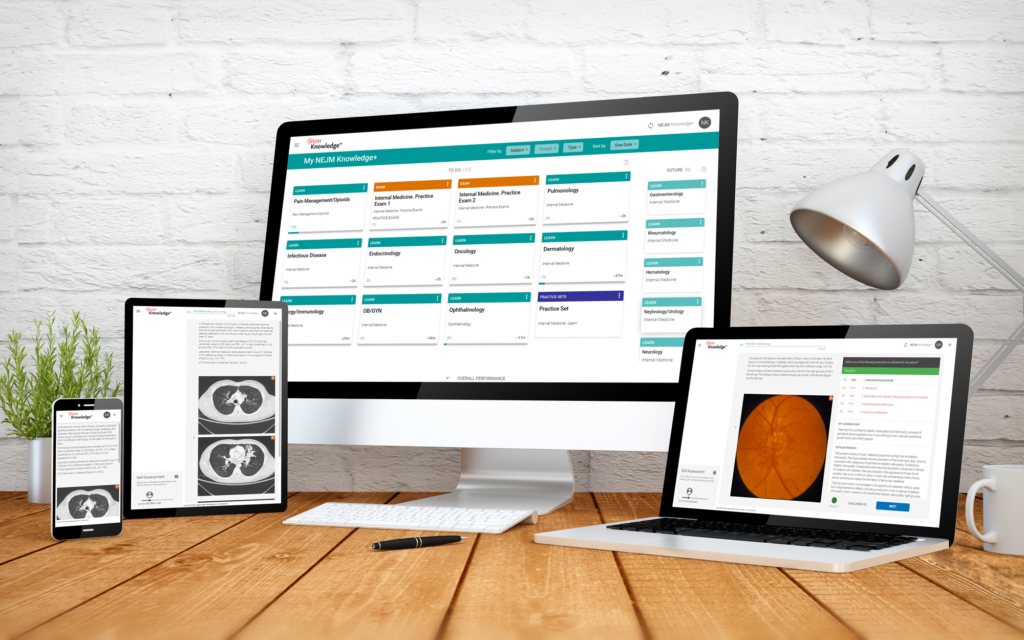We are pleased to announce that NEJM Knowledge+ is now exclusively part of AMBOSS.
Discover what this means for you: Learn more
Comprehensive adaptive learning combined with gold-standard questions and thoughtful feedback provides the best way for clinicians to learn, improve patient care, prepare for exams, and earn CME and MOC.
“I started using NEJM Knowledge+ and I think it is the best learning system that I have ever used. It is a very innovative method of learning that … keeps track of your learning on different topics and retests you in a strategic manner until you are proficient in the area. I could see this type of program as a required part of keeping up in internal medicine, and hopefully, we’ll see similar programs in the subspecialty areas in the future. I think that they are onto something really special!”
“Of all the board review platforms, NEJM Knowledge+ has the most unique learning format. The learner rates his or her level of confidence when answering questions, which helps to identify knowledge gaps and can also humble an overly confident student. Given the platform’s emphasis on clinical relevance, the learner can directly apply what is learned to patient care. NEJM Knowledge+ provides an opportunity to make your weaknesses into your strengths. It is so user-friendly, and the questions are very analogous to those in the board exam.”
“I found the practice exams helpful in taking my recertification boards. I felt that, of all the board prep products I looked at, they most closely simulated the real exam and believe they helped me get my mind ready for the actual day.”
“This is an amazing product. I have really enjoyed it. As a rheumatologist, I started with rheumatology just to gain confidence, but I’m really being tested in cardiology! I certainly like the same question coming back with different wording to reinforce the concept. The additional details and the links to resources are simply excellent. I truly do appreciate being able to access the information on multiple platforms.”
“I came to know about NEJM Knowledge+ just 3 days before my May 2014 exam. The ABIM questions were very similar to the questions in NEJM Knowledge+, which gave me a lot of practice. I finished my exam in almost half the time, and I got a top score. This product was not only useful for the ABIM exam but also reinforced my already acquired knowledge and provided me with new answers to my daily practice.”
“NEJM Knowledge+ is helpful because the cases come in smaller chunks so residents can retain it. The technology is attractive and more user-friendly, and we can actually track resident progress. The comfort level of whether or not they know what they don’t know is quite interesting, and the spaced repletion is extremely helpful.”
“NEJM Knowledge+ has been a positive step for our program and reflects our commitment to residents’ success. The powerful thing about NEJM Knowledge+ is the way it can track what residents are working on, how far they have gone, how much time they’re spending and where they are. It also tracks residents who need help. It gives us a better way of capturing real-time data, lets us create substantial reading plans for our residents, and hold residents accountable.”
“I am very happy with your program. It is a very stimulating intellectual exercise! I am enjoying these materials very much and believe others will find them exciting as well.”
“I am enjoying the content of this review product. This is the best CME experience I have ever been involved with. The relevance to my actual practice is very high. The ability to spend 30 minutes at a time when you have the time is a very time-efficient way to learn.”
“I have found NEJM Knowledge+ both fun and enlightening, and I have recommended it to several colleagues. You have done a great job with this.”
“We try to stay ahead of the curve in revising our GME curricula. We initially chose NEJM Knowledge+ to help us hold residents accountable for doing practice-forward exam questions and track their progress. It fosters residents’ ability to assess what they need to do to learn, and response from faculty has been good because it has provided more structure to resident coaching and gives us better insight into what our residents are doing. It lets us partner with residents to create individualized learning plans.”
“I wanted to compliment you on this board review platform. It is challenging and excellent in every way. I’m taking boards in April and hope to finish reviewing the questions before then. It’s awesome!”
Practice lifelong learning.
With NEJM Knowledge+, the medical knowledge you learn stays with you for a lifetime.
From the Learning+ Blog
ABFM Exam Day Essentials — Everything You Need to Know About the Day of the Test
If you have an ABFM exam approaching, you may have questions and some anxiety about what lies ahead. Whether you're [...]
Survival Guide for ABIM Exam Day
With your ABIM exam approaching, you probably have questions about what to expect on that day. Even if you’ve been [...]
Internal Medicine Question Banks — Which One is the Best Option for You?
If you’ve got an ABIM certification or recertification exam looming and you’re searching for the best Internal Medicine question bank, [...]
Authentic adaptive learning.
Our adaptive-learning platform continually tailors your experience to your specific learning needs. We ensure you don’t waste time on material you already know and guide you to focus on areas where you need reinforcement.

Maximize your time with NEJM Knowledge+ with:
Authentic adaptive learning question bank that provides true self-assessment to further develop your strengths and weaknesses
Bite-size learning at your desk, or on the go, no bulky books or expensive travel required
Gold-standard content free from outside influence




